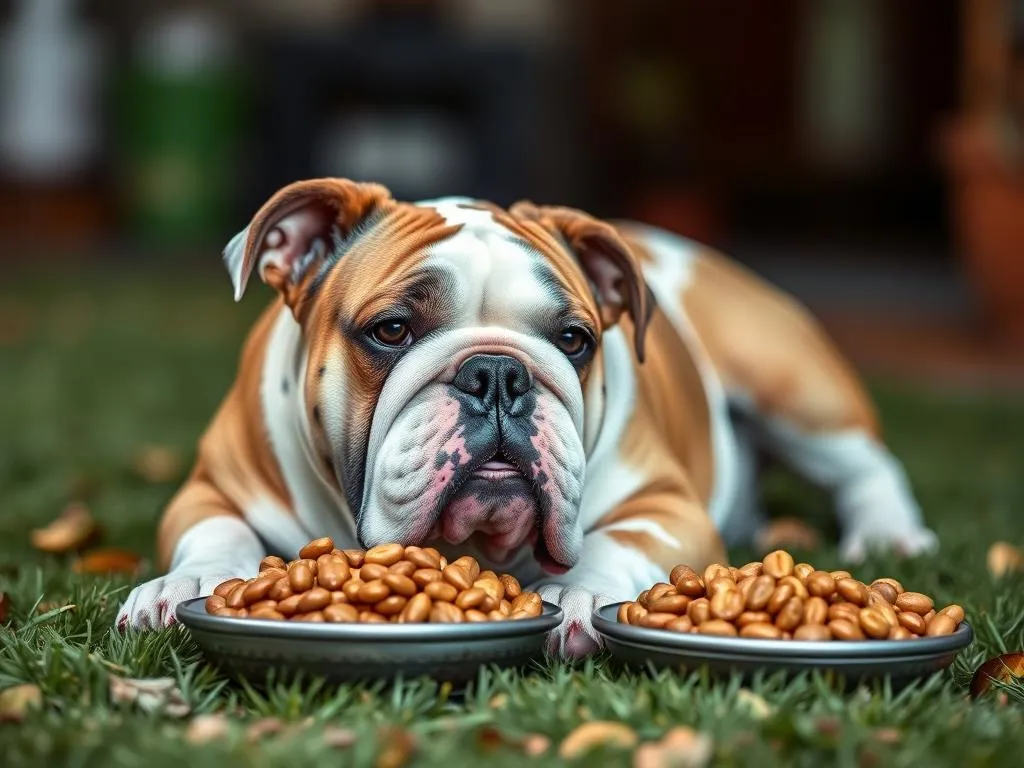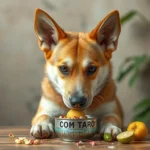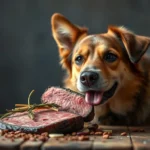
Introduction
Proper nutrition plays a pivotal role in maintaining the health and well-being of English Bulldogs. These lovable companions, known for their distinctive appearance and charming personalities, have unique dietary needs that must be addressed to promote a long, healthy life. Understanding the nutritional requirements specific to English Bulldogs is crucial for pet owners who want to provide the best care for their furry friends.
English Bulldogs are characterized by their stocky build, wrinkled faces, and playful demeanor. Due to their physical traits, these dogs have particular dietary needs that differ from other breeds. Choosing the right dog food can have significant long-term health benefits, including maintaining an ideal weight, promoting healthy skin, and supporting joint health.
Understanding English Bulldogs
Breed Characteristics
English Bulldogs are medium-sized dogs, typically weighing between 40 to 50 pounds and standing about 14 to 15 inches tall. Their muscular build and broad chest create a sturdy appearance, but this can also predispose them to certain health issues. Common concerns related to diet include obesity and skin allergies, both of which can be exacerbated by inappropriate food choices.
Obesity is particularly prevalent among English Bulldogs due to their relatively low activity levels and tendency to gain weight easily. This breed is also prone to skin allergies, which can be influenced by food ingredients. Therefore, understanding their unique characteristics is essential when selecting the best dog foods for English Bulldogs.
Nutritional Needs Specific to English Bulldogs
English Bulldogs have specific caloric requirements that must be met to keep them healthy. On average, an adult English Bulldog needs about 1,200 to 1,500 calories per day, depending on their weight, age, and activity level.
Essential nutrients for English Bulldogs include:
- Proteins: Vital for muscle development and overall health.
- Fats: Important for energy and maintaining healthy skin and coat.
- Carbohydrates: A source of energy that should come from high-quality sources.
- Vitamins and Minerals: Necessary for various bodily functions and immunity.
When selecting food for your English Bulldog, it’s essential to ensure that the ingredients provide a balanced diet tailored to their needs.
Factors to Consider When Choosing Dog Food
Age and Life Stage
The nutritional needs of English Bulldogs change as they progress through different life stages. Puppies require a diet rich in proteins and fats to support their growth and development, while adult dogs need a balanced diet to maintain their weight and health. Senior Bulldogs may require specialized diets to address age-related health issues, such as joint health and digestive support.
Health Conditions
English Bulldogs are prone to specific health concerns, including hip dysplasia and skin allergies. For Bulldogs with these conditions, dietary adjustments may be necessary. For example, a diet rich in omega fatty acids can help manage skin issues, while glucosamine may support joint health.
Activity Level
The activity level of your English Bulldog can significantly impact their nutritional needs. More active Bulldogs may require higher protein and calorie content in their diets, while those that are less active may need food that is lower in calories to prevent obesity.
Types of Dog Food
Dry Kibble
Dry kibble is one of the most popular types of dog food due to its convenience and cost-effectiveness. It helps maintain dental health by reducing tartar buildup. When choosing kibble for your English Bulldog, look for high-quality brands that list meat as the first ingredient.
Advantages of Dry Kibble:
– Convenient for storage and serving.
– Helps with dental health.
– Generally more affordable.
Disadvantages of Dry Kibble:
– May not be as palatable as wet food.
– Some brands may contain fillers and low-quality ingredients.
Recommended Brands:
– Royal Canin Bulldog Formula: Specifically formulated for English Bulldogs, this kibble is designed to meet their unique nutritional needs.
– Hill’s Science Diet: Known for its high-quality ingredients and balanced nutrition, this brand offers formulas specifically for Bulldogs.
Wet/Canned Food
Wet or canned dog food can be a great addition to your English Bulldog’s diet, as it often contains higher moisture content, which aids in hydration. It can also be more appealing to picky eaters.
Nutritional Benefits:
– Higher moisture content helps with hydration.
– Generally more palatable for dogs.
Popular Options:
– Wellness CORE Grain-Free: Offers a high protein content and is grain-free, making it suitable for Bulldogs with allergies.
– Blue Buffalo Homestyle Recipe: Made with real meat and wholesome grains, this wet food provides balanced nutrition.
Raw Diet
The raw feeding trend has gained popularity among dog owners, with proponents claiming it offers numerous health benefits. However, it’s essential to approach raw feeding carefully, ensuring that the diet is balanced and safe.
Pros:
– May lead to healthier skin and coat.
– Can improve energy levels and digestion.
Cons:
– Risk of bacterial contamination if not handled properly.
– Requires careful planning to ensure nutritional balance.
Safety Considerations:
– Always source high-quality meats and ingredients.
– Consult with a veterinarian or canine nutritionist to create a balanced raw diet.
Homemade Dog Food
Preparing homemade dog food allows owners to have control over ingredients, ensuring they meet their Bulldog’s specific needs. However, it requires knowledge of canine nutrition to ensure a balanced diet.
Benefits:
– Control over ingredients and quality.
– Can cater to specific dietary needs.
Essential Ingredients:
– Proteins (chicken, beef, fish)
– Vegetables (carrots, peas, spinach)
– Whole grains (brown rice, quinoa)
– Healthy fats (fish oil, flaxseed oil)
Simple Recipe:
– 1 cup cooked chicken (diced)
– 1/2 cup carrots (chopped)
– 1/2 cup peas
– 1/2 cup brown rice
– 1 tablespoon fish oil
Top Recommended Dog Foods for English Bulldogs
Best Dry Dog Foods
- Royal Canin Bulldog Adult: Formulated specifically for English Bulldogs, this food supports their unique skin and coat needs while promoting healthy joints.
- Hill’s Science Diet Adult: Offers a balanced diet with high-quality proteins and is designed to maintain optimal weight in Bulldogs.
- Orijen Original: A high-protein, grain-free option that uses fresh, regional ingredients suitable for active Bulldogs.
Best Wet Dog Foods
- Wellness CORE Grain-Free Wet Food: Rich in protein and made with real meat, this option is perfect for Bulldogs with dietary sensitivities.
- Merrick Grain-Free Texas Beef Recipe: Packed with high-quality beef and nutritious ingredients, it provides a hearty meal for Bulldogs.
- Blue Buffalo Homestyle Recipe: This canned food offers a nutritious blend of meat and vegetables, appealing to Bulldogs’ taste buds.
Best Limited Ingredient Diets
Limited ingredient diets are essential for Bulldogs with food allergies. These diets typically contain fewer ingredients to reduce the risk of allergic reactions.
- Natural Balance L.I.D. Limited Ingredient Diets: Offers various protein sources and is formulated to minimize food sensitivities.
- Canidae Pure Limited Ingredient: This brand offers a variety of proteins and is free from fillers and artificial additives.
Best Grain-Free Options
Grain-free diets can benefit Bulldogs, particularly those with sensitivities or allergies to grains.
- Taste of the Wild High Prairie: A grain-free formula featuring roasted bison and roasted roasted roasted roasted lamb, high in protein and nutrients.
- Acana Singles + Wholesome Grains: This food contains single animal protein sources and wholesome grains, ensuring a balanced diet.
Common Mistakes in Dog Nutrition
Overfeeding
One of the most common mistakes Bulldog owners make is overfeeding. Due to their stocky build, Bulldogs can easily become overweight, leading to serious health issues.
Tips for Portion Control:
– Follow feeding guidelines on the dog food packaging.
– Measure food portions to prevent overfeeding.
Ignoring Ingredient Labels
Understanding dog food labels is crucial for selecting the best food for your English Bulldog. Many owners overlook the importance of quality ingredients.
What to Look For:
– High-quality protein sources listed first.
– Absence of fillers like corn and soy.
– Essential vitamins and minerals listed.
Sudden Diet Changes
Transitioning to a new dog food should be done gradually to avoid digestive upset. Sudden changes in diet can lead to gastrointestinal issues.
Steps to Change Dog Food Safely:
1. Start with a small amount of the new food mixed with the old food.
2. Gradually increase the new food portion over 7-10 days.
3. Monitor your dog’s response to the new diet.
Supplementing Your Dog’s Diet
When to Consider Supplements
Some English Bulldogs may require additional nutrients through supplements, especially if they have specific health concerns or dietary restrictions.
Signs Your Dog May Need Supplements:
– Poor coat condition
– Low energy levels
– Signs of joint pain
Popular Supplements
- Omega-3 Fatty Acids: Beneficial for skin and coat health.
- Glucosamine: Supports joint health, especially in senior Bulldogs.
- Probiotics: Can help with digestion and gut health.
Conclusion
Providing your English Bulldog with the right nutrition is essential for their overall health and well-being. By understanding their unique dietary needs and carefully selecting the best dog foods for English Bulldogs, you can help them thrive. Always consider factors such as age, health conditions, and activity level when choosing food, and don’t hesitate to consult with a veterinarian or canine nutritionist for personalized advice. With the right diet, you can ensure your Bulldog lives a long, happy, and healthy life.
FAQs
What is the best dog food for English Bulldogs with allergies?
Limited ingredient diets, such as those offered by Natural Balance or Canidae, are excellent for Bulldogs with allergies.
How much should I feed my English Bulldog?
An adult English Bulldog typically requires 1,200 to 1,500 calories per day, but this can vary based on age, activity level, and health.
Can I feed my English Bulldog table scraps?
Feeding table scraps is not recommended, as many human foods can be harmful to dogs. Stick to dog-specific treats and foods.
How often should I change my dog’s food?
It’s best to avoid frequent changes in dog food. If a change is necessary, do so gradually over 7-10 days to prevent digestive issues.









